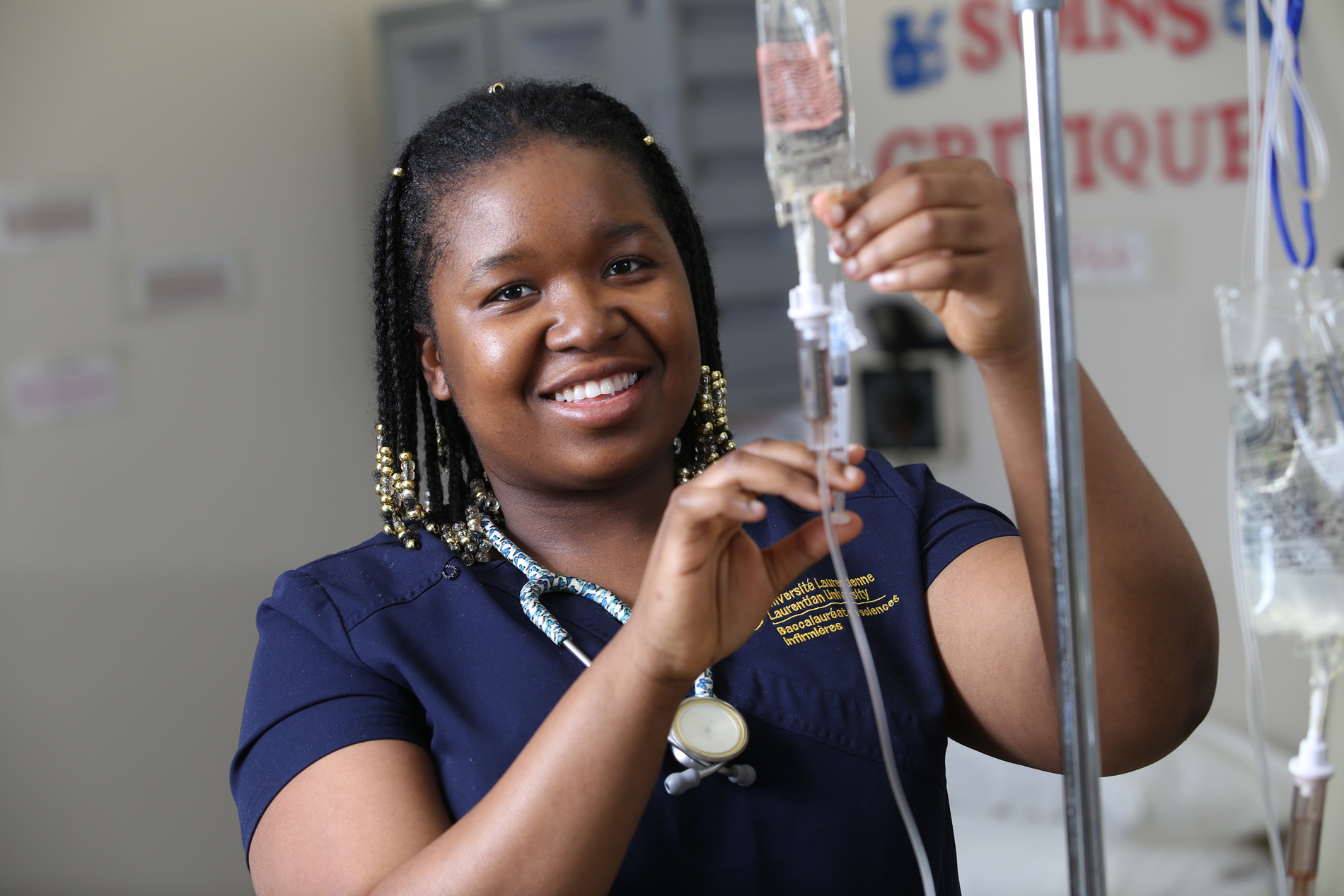
Nurse Practitioner (M.Sc.N./G.Dip)
Faculté d'éducation et de la santé
Diagnose, treat, and advocate for patients across diverse healthcare settings.

Survol du programme
Specialized learning opportunities teach you to advocate for patients, and offer comfort and care from within a comprehensive healthcare system.
This program provides nurses who have a Baccalaureate Degree to obtain an M.Sc.N. with a Nurse Practitioner designation.
This program also allows nurses with a Masters degree in Nursing to complete the Nurse Practitioner Program courses. Students must apply to the MScN Program in order to receive advanced standing.
A nurse practitioner:
- Is an experienced registered nurse with advanced education, skills, and extended class (EC) registration with the College of Nurses of Ontario
- Has the independent authority to perform controlled acts beyond those available to Registered Nurses (RNs), including ordering and interpreting diagnostic tests, communicating a diagnosis, prescribing pharmaceuticals, performing specific procedures, and referring to specialists.
- Provides health promotion, disease prevention, and illness management for individuals, families, groups, communities, and populations
- Often acts as the individual’s or family’s first point of contact with the health care system, similar to the role of a Family Physician
- Works collaboratively with other healthcare professionals to support the health of their clients
Laurentian University is part of a consortium of nine Ontario universities that offer the Primary Health Care Nurse Practitioner Program (PHCNP). Please see their website for more information about the program. Students register and learn in their home universities.
Our designated geographical boundaries extend from Sudbury, north to Moosonee and Moose Factory, northwest to Hornpayne, west to Wawa, east to Deep River and Lindsay, and South to Barrie. As such, our program is offered largely by distance delivery to accommodate the needs of students residing in Northern Ontario.
The program incorporates problem-based and self-directed learning, simulation, and competency-based strategies to meet the critical competencies for NP practice.
The deadline for applications to the program is February 1st for each year for Fall entry. Entry is in the Fall only.
Learn more about the Nurse Practitioner Primary Health Care Program expectations
The Nurse Practitioner Primary Health Care Program at Laurentian University is approved by the College of Nurses of Ontario. Current graduates from this program are eligible to apply for Extended Class registration as a Nurse Practitioner in Ontario.
Dive into a profession that includes an exciting blend of science, mathematics, psychology, anthropology, organizational management and sociology.
Available to study full- or part-time, using a hybrid format of online and onsite seminars, and must be completed in 3 years.
Gain hands-on experience through clinical placements.
Perspectives de carrière
Graduates can rest assured knowing there is a multitude of career options they can explore post-graduation. Some career options include, but are not limited to: Nurse Practitioner, health administration, research, academics and public health.
Many careers can be found in the public and private sector.
Détails du programme
Langue du programme:
English
Mode de présentation:
Hybride
Veuillez écrire à l’adresse courriel ci-dessus et notre équipe de recrutement vous répondra!
En savoir plus sur le programme
The Nurse Practitioner Primary Health Care Program at Laurentian University is approved by the College of Nurses of Ontario (www.cno.org). Current graduates from this program are eligible to apply for Extended Class registration as a Nurse Practitioner in Ontario.
Visit the School of Nursing and Allied Health Professions for more information
Exigences d’admission
- A minimum of two years (3640 hours) of full-time practice, as a Registered Nurse, within the past five years
- A recognized BScN degree (or the equivalent for RNs educated outside of Ontario)
- An overall average of 75% (GPA).
- Current certificate of registration as a registered nurse with the College of Nurses of Ontario.
- Successful applications must be Ontario residents as program placements must be done within the province.
- Successful applicants must be living within the Laurentian University placement area. See this website for more details.
- Preference will also be given to those whose work experience in nursing has been continuous and who have practical experience in one or more of the following areas: primary health care, ambulatory care settings, public health agencies, community health centres, emergency care, long-term care, or outpost nursing.
This is a limited enrolment program. Possession of minimum requirements does not guarantee admission.
NOTE: Students who have already achieved a master's degree may receive credits for some of the courses in the MScN/NP program. Please note this in your Personal Essay and Curriculum Vitae.
Application Process
Step 1. Click here to submit the online application. Once students have applied, they will receive instructions (typically within 48 hours) from the Office of Admissions leading them to the MyLaurentian portal. Students can access the portal at my.laurentian.ca; sign in credentials will be provided in the correspondence received from the Office of Admissions upon successful completion of an application. The following documents will be required in order to complete an application.
Documents:
- Three Reference Clinical Forms (to begin the process at my.laurentian.ca click on "Reference Submission" on the left-hand navigation menu)
- Personal Essay (instructions found in MyLaurentian/to be uploaded via MyLaurentian)
- Curriculum Vitae/Resume AND Declaration of employment hours of work. Original documentation is required. A minimum of 3640 hours worked in the last 5 years is required. (to be uploaded via MyLaurentian)
- Official Academic Transcript(s) from all post-secondary studies* (Please note that current or prior Laurentian University students do not need to request transcripts)
*Please note that official transcripts or WES course-by-course (for institutions attended outside of North America) must come directly to the Office of Admissions from the previous post-secondary institution by requesting at the time of your application or by contacting the institution's Registrar's Office.
Step 2. Once the Admissions Office receives all information and the application is deemed complete, the application will be forwarded to the department. An Admissions Committee meets to review the applications.
Step 3. The Admissions Committee will review all applications on file and make a decision regarding the suitability of each applicant. The Admissions Committee will then make a recommendation to the Dean of the School of Graduate Studies at Laurentian University. The Graduate Studies office will verify the dossier and if satisfactory, the Dean of Graduate Studies will forward the recommendation to the Office of Admissions at Laurentian University for admission.
Step 4: If approved for admission, the Office of Admissions will send the student an Offer of Admission via MyLaurentian. Applicants wishing to accept the offer of admission must indicate their response on MyLaurentian within 3 weeks of receiving the offer. Once the student has accepted the offer, a transition to the registration process occurs.
Comment déposer une demande
Pour faire une demande aux études supérieures, vous devez déposer votre demande d’admission auprès du Centre de demande d'admission aux universités de l'Ontario (CDAUO).
Pour obtenir des instructions détaillées sur le processus de demande d'admission, veuillez consulter les pages suivantes :
- Comment déposer une demande : Candidats canadiens aux cycles supérieurs
- Comment déposer une demande : Candidats internationaux aux cycles supérieurs
Déposer une demande en tant que candidat aux cycles supérieurs
Options de diplôme
Students must follow these regulations while in the Faculty of Graduate Studies.
Primary Health Care Nurse Practitioner (PHCNP) (M.Sc.N.)
Approved Fields of Study:
- Primary Health Care Nurse Practitioner
Program of Study
Required courses:
NURS-5106E Nursing Research I
NURS-5107E Nursing Research II
NURS-5126E Health Care Policy and Nursing Practice In Northern, Rural and Remote Environment
NURS 5136E Nursing Science and Theory
Nurse Practitioner-Specific Courses:
NURS-5306E Pathophysiology for Nurse Practitioners
NURS-5316E Primary Health Care Nurse Practitioner Roles and Responsibilities
NURS-5326E Therapeutics in Primary Health Care I
NURS-5327E Therapeutics in Primary Health Care II
NURS-5354E Advanced Health Assessment and Diagnosis I
NURS-5364E Advanced Health Assessment and Diagnosis II
NURS-5395E Integrative Practicum
NP Program Regulations
- All NP courses must be completed successfully before enrolling in the NURS 5395 Integrative Practicum.
- A minimum 70% is required to pass each NP course.
- Students who fail an NP course will have only one opportunity to repeat the failed course successfully.
- Students who fail a repeated NP course or fail a second NP course will be withdrawn from the NP program.
- Successful completion of all clinical placements is necessary in order to pass NP courses.
- Unless otherwise specified for the NP courses and program, Laurentian University academic regulations specific to the School of Nursing apply.
- Students must have completed all of their clinical hours prior to writing their final exams or OSCE testing.
- The NP program also follows the NP specific policies found at www.np-education.ca
- As per Laurentian University policies, absence from 20% or more of any required course seminars, clinical etc. will constitute a failure in the course.
Exemples de cours
For courses requirements for each PHCNP (MScN) program, please see Degree Options.
This course examines problem formulation and the utilization of nursing research. The course addresses quantitative approaches through the investigation of research questions in health care settings. Emphasis is placed on the development of evidence-based practice. cr 3.
This course addresses qualitative research approaches to nursing inquiry in health care settings. Emphasis is placed on contributions to evidence-based practice. cr 3.
Course content will include: values, beliefs and health behaviours of rural people, rural community health problems, special populations, issues in delivery of health care, community-based models of care, clinical practice challenges, curriculum planning, population health and determinants of health. Students will analyze health and social policy, and examine relationships among sociocultural, political, economic, technologic, environmental, ethical and legal factors as they impact nursing practice, health care delivery and public policy in a northern, rural or remote context. cr 3
This course examines theoretical and practice related concepts in pathphysiology as a basis for advanced nursing practice. Alterations in physiological function are explored with an emphasis on age-related, acute, episodic, and chronic conditions found in primary health care practice. (sem 3) cr 3.
The student compares and contrasts advanced nursing and related frameworks to develop, integrate, sustain, and evaluate the role of the nurse practitioner within primary health care. The student critically analyses and develops strategies to implement advanced practice nursing competencies (research, leadership, collaboration, and health and social policy). (sem 3) cr 3.
The student will critically appraise and interpret concepts and frameworks integral to pharmacotherapy, advanced counselling, and complimentary therapies for common conditions across the lifespan. The student will develop, initiate, manage, and evaluate therapeutic plans of care that incorporate client values and acceptability, goals of therapy, analysis of different approaches, and pharmacotherapeutic principles. PREREQ or COREQ: NURS 5356. (sem 3, clinical 6) cr 3.
The student will integrate conceptual frameworks and evidence underlying the study of pharmacotherapy, advanced counseling and complementary therapies for complex client situations. The student will demonstrate substantive initiative, responsibility, and accountability in complex decision making. cr 3.
In this course students will synthesize competencies essential to advanced practice nursing to provide primary health care for clients across the life span. Students will demonstrate autonomy in decision-making, and critical analysis of organizational and system issues that influence scope of practice, professional accountability, and outcomes. PREREQ: NURS 5306, 5316, 5326, 5327, 5356, 5357. (Total seminar time: 36 hours; Total clinical time: 419 hours; Total course hours: 455 hours.) cr 6.
This course examines the development and organization of nursing knowledge. Patterns of knowing may seem unreconcilable to nursing praxis in our current health care systems. Within this context, it is imperative to examine the philosophical underpinnings so as to deepen the meaning of the nature of nursing: what nurses do; how they further their knowing; and what effect they have on the discipline of nursing. The course will aim to help students understand how the body of nursing knowledge has borrowed from traditional science. The ontological and epistemological underpinnings of nursing's pursuits of knowledge will be critically examined. To this end, students will be guided in deepening their patterns of thought and to relate it in examining the gap between theory and practice. At the end of the course, students are expected to be able to apprehend and critique the complexity of providing nursing care. cr 3
The student integrates conceptual frameworks integral to advanced health assessment, clinical reasoning, and diagnosis in advanced nursing practice. The student demonstrates substantive initiative, responsibility, and accountability in complex decision making for individual clients, groups, and/or communities within the nurse practitioner scope of practice. PREREQ: NURS 5354. (sem 3, lab 1, clinical 6.5) cr 4.
The student will differentiate concepts and frameworks essential to advanced health assessment, clinical reasoning, and diagnosis in advanced nursing practice. The student will apply clinical, theoretical, and scientific knowledge in comprehensive and focused health assessment, including history taking, physical examination, diagnostic reasoning, and interpretation for the individual client's diagnostic plan of care. PREREQ or COREQ: NURS 5306. (sem 3, lab 1, clinical 6.5) cr 4.
Membres du corps professoral
Prêt(e) à passer à la prochaine étape?
Nous sommes là pour vous aider à commencer votre parcours à Laurentienne.



